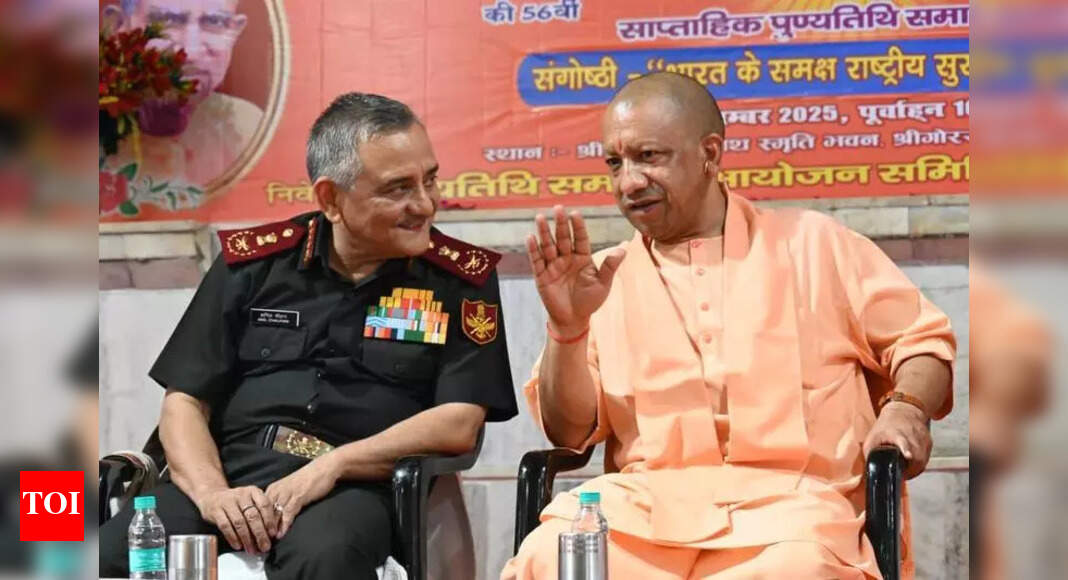Lucknow: Chief of Defence Staff General Anil Chauhan on Friday said territorial conflicts with China and Pakistan are India’s biggest national security challenges.Border disputes are not just diplomatic issues—they are the root of armed conflict, he said while addressing a seminar on “Challenges to National Security in India” in Gorakhpur where Chief Minister Yogi Aditynath was also present.General Chauhan said that India’s challenges are “not momentary but persistent,” demanding constant preparedness and strategic cohesion. He identified the unresolved border dispute with China as India’s “biggest challenge”. The second challenge, he said, stems from Pakistan’s proxy war strategy of “bleeding India by a thousand cuts”.The third challenge lies in regional instability, with almost all neighbouring countries grappling with social, political and economic turbulence, creating openings for external interference, he said, addin that the fourth challenge was the changing nature of warfare, which now extends to space and cyberspace and other domains. “Future wars will be multi-domain, and we must achieve cohesion across all forces,” he stressed.He called Pakistan and China’s nuclear capabilities the fifth challenge, complicating the calculus of conventional warfare. The sixth challenge, he added, is technological, as wars are becoming “more intelligent” with rapid advancements in military tech.Gen Chauhan said the armed forces were given full operational freedom to conduct Operation Sindoor and its aim was not only to avenge the Pahalgam terror attack, but also to draw a “red line” on cross-border terrorism.In first such public comments, the CDS also said that the National Security Advisor (NSA) played a significant role in planning and implementation of Operation Sindoor in terms of providing guidance to the military that included target selection, deployment of troops, framework for de-escalation and use of diplomacy.The CDS said the threat landscape is shifting beyond physical borders and warned of new-age threats, particularly cyberattacks, which he described as increasingly frequent and sophisticated. “These digital incursions, he noted, can disrupt critical infrastructure, steal sensitive data, and undermine national stability,” he said.”The battlefield is no longer just land, sea, or air—it’s also in cyberspace. Cyberattacks are striking at an alarming rate, pose a new, invisible danger. Warfare itself is evolving, with decentralized methods like robotics and unmanned combat looming on the horizon, demanding fresh strategies,” he said, urging for robust cyber defence mechanisms.He emphasized that national security is a multidimensional concept, interpreted differently by diplomats, economists, and soldiers. While diplomats focus on alliances and negotiations, economists prioritize financial resilience, and soldiers concentrate on defence capabilities.Drawing from Chanakya’s ancient wisdom, Chauhan outlined four categories of threats: internal, external, internal threats supported externally, and external threats supported internally—each demanding a tailored response.Chauhan highlighted three foundational pillars of India’s security framework: land security – protecting territorial integrity; ideological security – safeguarding national values and unity, and citizen safety – ensuring the well-being of every Indian.He called for enhanced defence resources, research and development, and a strong strategic culture, proposing the creation of a National Defence University to train future leaders and thinkers in defence strategy.Highlighting the element of surprise in warfare, the CDS cited India’s tactical brilliance in the Uri surgical strike, Balakot airstrike, and drone operations post-Pulwama, where Indian forces achieved success by catching adversaries off guard. “Surprise is a strategic asset,” Chauhan said, affirming the military’s readiness to act decisively at any moment.He described Operation Sindoor as a unique mission with minimal direct combat and no defined front lines. The operation, still ongoing, was designed to target terrorist bases with precision, guided by clear political directives and aimed at raising the threshold of strategic patience.
